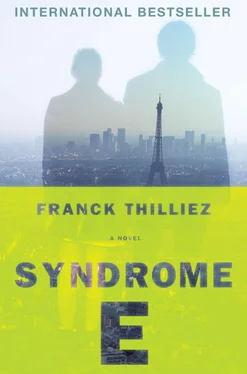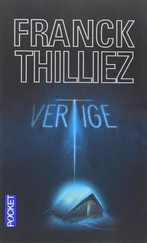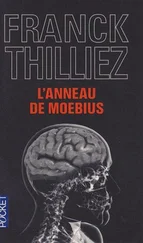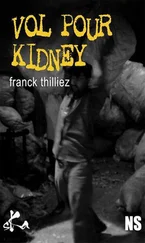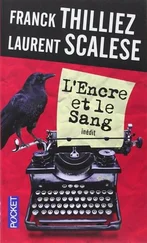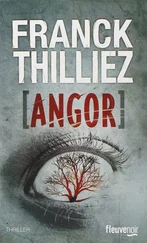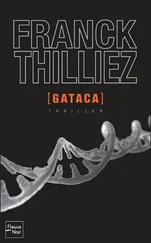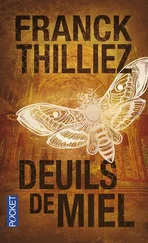“Is something wrong, Inspector?”
“No, everything’s fine. Tell me, did you notice anything suspicious at your place in Lille?”
“Such as?”
“Such as hidden microphones. I found four of them here.”
Sitting cross-legged in the middle of the bed, Lucie felt her blood go cold.
“The knob to my outside door grated a bit a few days ago. They must have broken into my apartment too—I’m sure of it.”
Lucie felt the blow. The feeling of violation. They had penetrated into her space, her cocoon. They might have gone into her room, into her girls’ room.
“Who did it?”
“I don’t know. What’s certain is that the colonel in charge of the Foreign Legion is involved.”
“How do you know that?”
“I just do. Don’t tell anyone about the mics, okay? We’ll take care of it when you get back.”
“How come?”
“Quit asking questions! Keep me posted. Talk to you soon.”
“Inspector! Wait!”
The air-conditioning rumbled hypnotically. And it felt so good to hear Sharko’s voice.
“What, Henebelle?”
“There’s something I need to ask you…”
“What’s that?”
“Have you saved a lot of lives in your career?”
“Some, yes. But unfortunately not always the ones I would have liked.”
“In our profession, we comfort the families by finding the people who killed their loved ones. We probably give a handful of people a reason to go on living, because we give them an answer. But, Inspector, haven’t you ever felt like just quitting the whole thing? Don’t you ever tell yourself the world would be no better or worse off without you?”
Sharko spun his weapon on the table, flicking the grip with his finger. He thought of Atef Abd el-Aal. Of those eight marks on the tree trunk. Of all those he’d been able to take care of, with the certainty that they’d never do it again.
“I felt like quitting every time I saw a smile on the faces of the bastards I put in jail. Because that smile was something that no bars and no prison could contain. And later, you start seeing that smile in shopping malls, playgrounds, schools, wherever you go. That smile makes me retch.”
He slammed his palm down on his gun, stopping its movement. His fingers closed over the barrel.
“I wish only one thing for you, Henebelle: that you never come across that miserable smile. Because once it gets into you, it never comes out.”
Lucie clenched her jaws. She stared at the ceiling with a sigh. The shadows were coming back fast and furious.
“Thank you, Inspector. I’ll keep you posted on what happens. Good night.”
“Good night, Henebelle. Take good care of yourself.”
Lucie hung up, sadness pressing down on her.
At that moment, she understood that to go back, to return to the life of a woman and a mother, would not be easy. Because that smile he was talking about, she had already come across, way too early in her young career.
It had been gnawing at her insides for a long time.
Lucie spent an agitated night filled with bad dreams. Images had seized on the quiet hours to harass her: the little girl on the swing, the bull, the rabbits, Judith Sagnol with her pupil slit, her belly mutilated with a large, black eye.
Twisting and turning in bed, watching the digital clock on the television dilute the time minute by minute, Lucie was waiting for only one thing: the sun to finally rise.
And rise it did. At nine o’clock, she was walking in the streets of the Canadian city, taking advantage of the morning freshness to clear away the fatigue in her muscles.
The central archives of Montreal were located about a hundred yards from the Old Port, in the heart of a thickly tree-lined neighborhood. They were housed in a Beaux Arts–style government building, with large blocks of white stone and massive colonnades, that had once been the university’s business school.
When Lucie entered, her backpack stuffed with fruit from the hotel, a bottle of water, her memo book, and a pen, she felt like a ridiculous ant lost in a desert of paper. According to the first archivist she talked to, these walls, beneath the high, sculpted ceilings and magnificent chandeliers, contained more than twelve miles of data, split between private, governmental, and civic records. One could delve into the lives of the great families of Montreal and Quebec, the Papineaus, Lacostes, and Merciers, as well as find information about immigration, education, energy, tourism, and legal affairs, not to mention some nine million photos and two hundred thousand drawings, maps, and plans. A citadel of paper within a city of steel and concrete.
To give herself the best chance, Lucie had prepared a brief summary of what she hoped to find. The archivist who had greeted her referred her to someone else, who should know more about Quebec’s history in the 1950s. The badge on the second archivist’s white blouse read PATRICIA RICHAUD.
“I’m looking for a little girl who almost certainly was in a convent or orphanage in the fifties,” Lucie explained. “To be more precise, around 1954 or ’55. The institution was probably located in or around Montreal. I also have the name of a nun she would have known: Sister Marie du Calvaire.”
The archivist looked at the picture of the girl on the swing, then beckoned Lucie to follow her.
“Do you know how many Sister Marie du Calvaires there were at the time? Unfortunately that bit of information won’t help you much.”
Patricia Richaud was about fifty, with blond hair fastened in a ponytail and small round glasses. The two women walked down endless corridors, which didn’t at all match the fusty image one might have of such a place. Clean, pure lines, futuristic design. There were even guided tours—people were already moving around in groups in the vast library. Lucie was sure they had walked a good five minutes, going up and down various stairways, before they reached a small, circular, windowless room with fluorescent lights. The files were lined up in hundreds of cabinets that rose many feet in the air and could be reached with rolling ladders. Among other things, the cop could read JUVENILE DELINQUENCY CASES (1912–1958), SOCIAL WELFARE CASES (1950–1974), and so on. The archivist halted in the middle of the room.
“Here you are. If you ask me, this is where you have the best chance of finding what you’re looking for. Most of these files concern orphans under the age of sixteen. The juvenile delinquency cases, for instance, concern children abandoned by their parents in circumstances that made it likely they’d turn to crime.”
Taking advantage of a break in the conversation, Lucie pointed to another part of the alcove, which particularly caught her attention: RELIGIOUS COMMUNITIES (1925–1961).
“And what about those?”
Richaud instinctively touched the pendant she was wearing, which hung from a gold chain.
“You’re in luck—we received those files only a few weeks ago. Normally they would have been restricted because they belonged to religious institutions. But now Quebec is turning away from its religion. We are now a world besotted with modernism, and one by one those institutions are being forced to close due to a cruel lack of funding. And so their records have come to us, because they have nowhere else to store them.”
She sighed.
“As you can see, there are quite a number of these files, since they also include orphanages from neighboring towns and regions. These religious communities were quite active at the time, especially in taking in illegitimate orphans.”
“Illegitimate? Can you be more specific?”
As if she hadn’t heard, the specialist headed toward a group of metal file cabinets. She opened one, containing a seemingly infinite number of index cards.
Читать дальше
